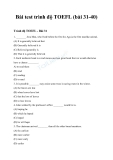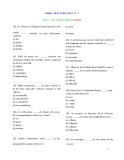
Nguy n Th Ph ng Th oễ ị ươ ả
Reading comprehension -TOEFL- Lesson 15 (Đ cọ
hi u -TOEFL- Bài 15)ể
Đ c đo n văn sau và tr l i các câu h i:ọ ạ ả ờ ỏ
It is very difficult to succeed in the music business; nine out of ten
bands that release a first record fail to produce a second. Surviving
in the music industry requires luck and patience, but most of all it
requires an intricate knowledge of how a record company
functions. The process begins when a representative of a company's
Artists and Repertoire (A & R) department visits bars and night
clubs, scouting for young, talented bands. After the representative
identifies a promising band, he or she will work to negotiate a
contract with that band. The signing of this recording contract is a
slow process. A company will spend a long time investigating the
band itself as well as current trends in popular music. During this
period, it is important that a band reciprocate with an investigation
of its own, learning as much as possible about the record company
and making personal connections within the different departments
that will handle their recordings.
Once a band has signed the contract and has finished recording an
album, the Publicity and Promotions department takes over. This
department decides whether or not to mass produce and market the
band's album. Most bands fail to make personal contacts in this
second department, thus losing their voice in the important final
process of producing and marketing their album. This loss of voice
often contributes to the band's failure as a recording group.
1. Which of the following statements best expresses the main
idea of the passage?
(A) Nine out of ten bands fail to produce a second record.
(B) It is important for a band to have an intricate knowledge of how
a recording company works.
(C) Making personal connections will help the band in the final
decisions about the promotion of their album.
(D) The main factors in a band's success are luck and patience.
2. As used in line 2, what is the meaning of the word "release"?

(A) distribute
(B) pay for
(C) overturn
(D) itemize
3. The phrase "an intricate" in line 4 could be best replaced by
which of the following?
(A) a fleeting
(B) a straightforward
(C) an extraneous
(D) a detailed
4. According to the passage, the initial contact between a band
and a recording company is made by
(A) the band's manager
(B) a band member
(C) an AR representative
(D) the Publicity and Promotions department
5. The word "reciprocate" as used in line 12 could be best
replaced by which of the following?
(A) commence
(B) respond
(C) practice
(D) confirm
6. The word "investigation" in line 12 is closest in meaning to
which of the following?
(A) production
(B) betrothal
(C) credential
(D) examination
7. Which of the following words is most similar to the word
"handle" as used in line 15?
(A) touch
(B) control
(C) manipulate
(D) protect
8. As used in line 17, what is the meaning of "takes over"?
(A) takes charge
(B) takes pleasure
(C) takes advice
(D) takes blame

9. The author mentions that a band's success is dependent on all
of the following factors EXCEPT
(A) having patience
(B) making personal contacts with people in the company
(C) understanding how a record company functions
(D) playing music that sounds like music of famous bands
10. According to the passage, the Publicity and Promotions
department
(A) has the final decision in producing an album
(B) handles the recording arrangements for the band
(C) sends representatives to look for new talent
(D) visits bars and night clubs
11. The author uses the phrase "losing their voice" in lines 20 to
illustrate that they
(A) are forbidden to speak
(B) are unable to visit
(C) have no representation
(D) are too shy to express their desires
12. It can be inferred from the passage that
(A) the music industry is full of opportunities for young bands
(B) the AR department has a very large staff
(C) most bands do not fully understand how record companies
operate
(D) the cost of recording an album is very expensive
Reading comprehension -TOEFL- Lesson 16 (Đ cọ
hi u -TOEFL- Bàểi 16)
Đ c đo n văn sau và tr l i các câu h i:ọ ạ ả ờ ỏ
About 200 million years ago, as the Triassic Period came to a close,
many species of animals disappeared from the face of the Earth.
Scientists previously believed that the series of extinctions

happened over a period of 15 to 20 million years. Recent
discoveries in Nova Scotia suggest, however, that the extinctions
may have happened over a much shorter period of time, perhaps
less than 850,000 years.
Evidence for a rapid extinction of species at the end of the Triassic
Period is found in the McCoy Brook Formation along the Bay of
Fundy in Nova Scotia. Fossils found in this formation indicate a
rapid disappearance of species rather than a slow and gradual
change over time. One explanation for a relatively sudden
extinction at the end of the Triassic may be that a large meteorite
struck the earth at the time and is responsible for a 70- kilometer
hole nearby. If geologists and other researchers can find evidence,
such as shocked quartz in the rock formations, that a meteorite did
strike the earth, it would give more credence to the theory of rapid
Triassic extinctions. It is possible, however, that even if a rapid
extinction happened in and around Nova Scotia, it did not
necessarily occur in the rest of the world.
1. What is the main topic of this passage?
(A) the disappearance of animal species at the end of the Triassic
Period
(B) evidence of a relatively sudden extinction of species
(C) the possibility of an extinction happening simultaneously
throughout the world
(D) a meteorite hole in the Bay of Fundy in Nova Scotia
2. Which of the following could best replace the word "close" as
used in line 1?
(A) connection
(B) dispersion
(C) separation
(D) end
3. The author uses the phrase "the face of the Earth" in line 2 in
order to
(A) emphasize the disappearance
(B) focus on one part of the Earth
(C) focus on one period of time
(D) point out the reference to land, not water
4. All of the following were mentioned in the passage EXCEPT
(A) the extinction of late Triassic animals

(B) the duration of time for the extinction
(C) a large meteorite hitting the Earth 10 million years ago
(D) the use of types of rock in scientific research
5. Which of the following is closest in meaning to the word
"relatively" in line 11?
(A) comparatively
(B) independently
(C) phenomenally
(D) visibly
6. Where in the passage does the author give evidence for the
argument?
(A) Lines 1-4
(B) Lines 8-12
(C) Lines 12-17
(D) Lines 17-20
7. According to the passage, what would give evidence that a
meteorite struck the earth?
(A) a gradual change in species over time
(B) a change in the quartz
(C) gold deposits in the veins of rocks
(D) a change in the waters of the Bay of Fundy
8. Which of the following could best replace the word "struck"
as used in line 12?
(A) affected
(B) discovered
(C) devastated
(D) hit
9. Which of the following is most probably the meaning of
"shocked quartz" in line 15?
(A) narrow chasms
(B) tiny lines
(C) hardened ores
(D) cracked minerals
10. In line 16, "it" refers to
(A) evidence
(B) an extinction
(C) the Earth
(D) a meteorite
11. Which of the following could best replace the word
"credence" in line 16?













![Tài liệu luyện thi TOEIC cấp tốc trong 10 ngày [chuẩn nhất]](https://cdn.tailieu.vn/images/document/thumbnail/2025/20251029/kimphuong1001/135x160/99661761725822.jpg)
![Tài liệu Phá đảo TOEIC 900+ từ mất gốc trong 30 ngày [Mới nhất]](https://cdn.tailieu.vn/images/document/thumbnail/2025/20251029/kimphuong1001/135x160/2101761720956.jpg)











